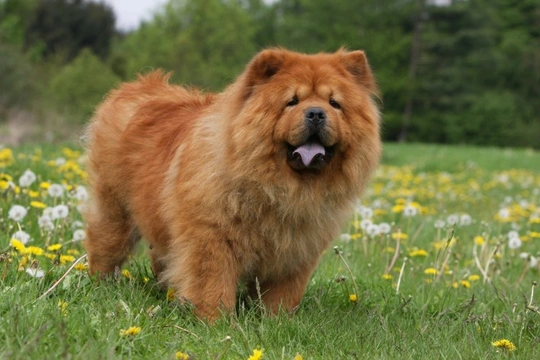
The Chow Chow and Hypothyroidism Health Issues
Chow Chows are not only beautiful looking dogs, but they are intelligent and loyal too which is why over the years they have become one of the most popular breeds around. Their distinctive blue tongues and their gorgeously thick coats sets them apart from other dogs, but like so many other pure breeds the Chow is prone to suffer from hereditary health issues, one of which is Hypothryroidism.
Contacting a Reputable Breeder is Essential
If you have set your heart on sharing your home with a Chow puppy, it's really important to know as much about their parentage as possible because a well-bred dog stands a much better chance of not inheriting this and other painful health disorders. However, it's worth bearing in mind that no matter how well-bred a Chow happens to be, there's never any guarantees they would not at some point in their lives develop a hereditary health issue, it just reduces the risk of this happening.
The breed is predisposed to suffering from Hypothyroidism and research has also established that these dogs are also prone to having a hormone imbalance which is typically either a specific enzyme they are missing or which is not present in the amounts it should be. This imbalance affects how their adrenal glands work which as a result means dogs cannot produce enough cortisol. Another issue seen in the breed is when growth hormones don't work as they should and as a result, this affects the amount of folds found on a dog's head, neck, bodies. Research has also shown that Chows have very narrow wind pipes which can be as narrow as that of cats. In short, research suggests that Chows often suffer hormone deficiencies simply because of their make-up.
Main Cause of Hypothyroidism in Chows
Research has also suggested that the main reason why Chows are so prone to suffering from Hypothyroidism is a condition known as 'Autoimmune Thyroiditis'. This is a health issue where a dog's own immune system starts to attack its thyroid gland.
The Signs to Watch Out For
When a dog develops the condition there are certain symptoms to watch out for which includes the following:
- Dogs develop abnormalities on their skin which includes infections, scaly skin, excessively oily skin that's often quite smelly
- They suffer hair loss specifically around their necks and tails
- Dogs often suffer ear infections
- Their coats become brittle and dry with their outer coat breaking very easily which then just leaves their shorter undercoats exposed
- Dogs tend to be lethargic or sometimes they become listless and generally weak
- Dogs tend to be anaemic
- A dog with the condition puts on weight very easily and has a hard time losing any excess weight they may be carrying
- Soft tissues on their bodies start to thicken in particular around their faces and head which as a result creates more folds in their skin
- Dogs often feel the cold quite acutely
- They have slower heart rates and/or abnormal rhythms
- They develop Corneal Dystrophy when the condition is more severe which would require veterinary intervention
- A female dog often experiences abnormal heat cycles
- Paralysis in a dog's facial muscles may occur if the condition is very severe
- A dog might slip into a coma although luckily this is quite rare
Behavourial Problems Associated with the Condition
Many Chow owners first realise something is very wrong with their pets when their personalities start to change which can not only be very worrying, but distressing too. These changes in a dog's character can include the following:
- Aggressive behaviour which is often unprovoked
- A dog might start to experience seizures
- Dogs often seem very disoriented even when they are in familiar surroundings
- Dogs tend to be moody and depressed
- A dog might suddenly become hyperactive, demanding more attention
- They often start to show fearfulness at familiar things and situations
- Dogs often become quite irritable and snap at the slightest thing
Nobody really knows why hypothyroidism affects a dog's temperament so much although it is thought that the amount of cortisol circulating in their systems may have something to do with this.
Environmental Factors Can Play a Part
It is also thought that environmental factors can play an important part in the fact a Chow may develop the condition. The good news is that Chows can be screened for the disorder so that only healthy dogs are used in any breeding programme. The test assesses the levels of anti-thyroid antibodies are found in a dog's blood which allows breeders to see if a Chow would be more prone to passing on the condition to their offspring via a mother's colostrum milk.
Diagnosing the Condition
Vets often find it quite hard to diagnose Hypothyroidism simply because there are other health issues that produce the same sort of systems in dogs, one of which is Addison's Disease. Sadly, for breeders this is a particular challenging because finding out if a Chow is clear of Hypothyroidism can prove quite hard. The other bad news is that even a spayed female Chow is at risk of developing the condition and sometimes they are at a higher risk than an entire female Chow.
The symptoms of Hypothyroidism usually manifest themselves when Chows are around 4 years old or sometimes a little older. The good news is that vets can very successfully treat the condition so if an owner suspects their Chow might be developing Hypothyroidism, it's best to err on the side of caution and have a dog tested which would involve full thyroid screening.



